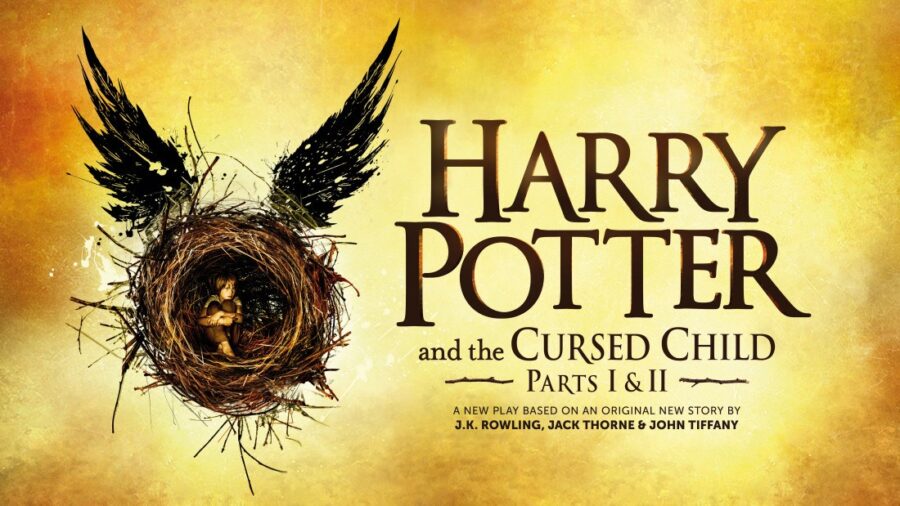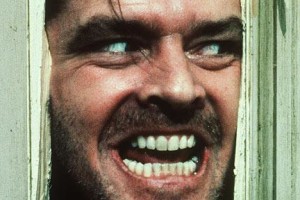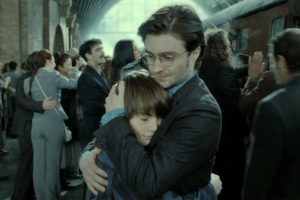So yesterday I read through “the eighth story” of the Harry Potter series: Harry Potter and the Cursed Child. Since it has not been out for very long I will refrain from posting any considerable spoilers. Considering that this story is the script for a play that has been performed in London for several weeks already, I’m a bit surprised that it wasn’t spoiled for me already. I’m grateful for the #KeeptheSecrets movement, and in that spirit I will keep my post to more general observations and comments. There is one spoiler-ish item that I’d like to address, and I will flag it when I come to it, but even then I won’t go into any specific details.
First off, let’s return to this idea that what I just read yesterday is “the eighth story” in the series. Yes, I put “the eighth story” in quote marks because I do not believe that the Harry Potter canon is an open canon (here I am very much influenced by Dr. John Mark Reynolds). J. K. Rowling set out to write seven novels, and the contents of these novels alone (not the interviews, not the additional material on Pottermore, not the movies, not anything else) constitute the canon of Harry Potter.
At one point yesterday I was reading The Cursed Child at a coffee shop. A girl who noticed my book came up to me and asked me what I thought. I was about halfway through it and I was about to open up with some canon fodder (get it?!), but instead I began by asking if she’s a fan of the series. She responded resoundingly, affirming that she had recently read through Deathly Hallows a couple of times because she loves it so much. Now I’m thinking, okay cool I won’t say any spoilers, and then I ask her when she plans on reading the book. Surprisingly, she just kinda shrugged and said, “I’m not sure if I’ll even read it because I don’t want it to negatively affect my view of the series.” And then I told her that this is only a problem you have to worry about if you think the Harry Potter canon is open. Because if it’s closed, then there is nothing to lose from more Harry Potter stories; some can be good, some can be bad (though preferably all of them will be great), and nothing detracts from the greatness of the seven novels.
So I believe that this approach to canon has a pragmatic value, but structurally-speaking there’s no way around the fact that The Cursed Child simply cannot be “the eighth story” in any reckoning (except for that of the almighty dollar). Rowling wrote seven novels for a very obvious symbolic reason. Additionally, John Granger, known as the Hogwarts Professor, has skillfully demonstrated how meticulous Rowling was in structuring the series as a whole (and not to mention each individual book) as a ring composition. Without getting into all the many details that could be put forward (and if you’re interested, you should check out some of Granger’s publications on his Amazon page and the blog posts on his website), the point is that the stories have been scaffolded in such a way that the series had to end precisely where it did. What makes this point even more pressing—drawing to mind again that Rowling always intended to write seven novels and only seven novels—is the fact that she claims that she wrote the final chapters of The Deathly Hallows at the very beginning of the entire writing process. She always kept the “goal” in mind, she knew where the story was headed, and she stayed on track.
So when I first heard of The Cursed Child my thought was, awesome I would love more Harry Potter stories! But once I heard that it was dubbed, “the eighth story,” my heart sank. The narrative arc clearly came to an end with Deathly Hallows. More stories can be told in the wizarding world, absolutely, but they are not part of that same narrative arc. One of the simple ways that this is clear, even if we disregard everything else that I’ve said already, is the fact that The Cursed Child is “the eighth story” and not “the eighth book.” Perhaps even more obvious is the fact that Rowling is not the sole author of the story—it is co-authored by John Tiffany and Jack Thorne—and it is unclear exactly how prominent Rowling’s role was in the whole process. And having just read the book I can say more clearly that The Cursed Child does not feel like a Harry Potter book at all (being, of course, a script and not a proper book), much less a Harry Potter story.
Why do I say that?
To begin, Harry Potter, the ostensible protagonist—given that he held that role in the seven novels and given that the title of this story is Harry Potter and the Cursed Child—is not actually the main protagonist of this story. The story follows his son, Albus (an absolutely massive clue that this is not “the eighth story” of the same narrative arc). On top of this, not only is Harry Potter not the main character, he’s hardly the same character. Nothing about Harry in this book resembles the boy we loved—The Boy Who Lived. There are a number of things I’d like to add to this, but for this post I’d prefer to focus on one major plot device which to me is a fundamental discrepancy between The Cursed Child and the seven novels. At this point I should say that I will be introducing some spoilers, though I will keep my comments as general as possible.
Accio Spoiler Warning!
The major plot device in The Cursed Child is the infamous Time-Turner. I have several problems with the way that this is utilized. In general I find the use of the device to be supremely overplayed in this story. In Prisoner of Azkaban (my pick for the greatest of the seven novels), the Time-Turner plays an important, though discrete role, in the narrative. It comes onto the scene as a fun twist to the story. It should be stressed that the Time-Turner is admittedly ridiculous. Imagine an actual wizarding world where such devices exist; there should either be constant un-doings of evil (if the Time-Turner is in good hands) or constant evil doings (if the Time-Turner ends up in the wrong hands). This is the biggest critique I have heard from Harry Haters who know the story. And there’s something to this. But by side-lining the Time-Turner we can get past it—out of sight, out of mind. The silliness of this magical device can be overlooked by fans like myself who look at Prisoner of Azkaban as one of the shorter earlier books in the series that were still self-consciously written for younger audiences. But when the Time-Turner becomes front and center, as in The Cursed Child, especially when there are more than one involved, the absurdity of it all is hard to conceal or look past. In principle it might not be so bad to utilize the Time-Turner more than in the previous stories, but this brings up all sorts of questions about why the Time-Turner hasn’t been the major plot device in every previous story (I mean, if it’s part of the wizarding world why not?). Clearly, the reason is because it’s too unwieldy. And The Cursed Child displays that. And this brings me to my biggest problem with the use of the Time-Turner in The Cursed Child—the mechanics of time travel in this story are inconsistent with those of Prisoner of Azkaban.
In The Cursed Child, the past can be altered and rewritten. A small change can create a “ripple” in history. So we get to see a few different scenarios play out as a result of changing the past. Essentially, The Cursed Child should be re-titled, Harry Potter and the Butterfly Effect. However, Prisoner of Azkaban is not like this at all. The time travel in Prisoner of Azkaban is actually much more sophisticated. And I had to learn this the hard way.
I wrote a blog post in December of 2011 on Christmas and Time Travel, and in that post I talked about different kinds of time travel in movies and literature. I listed Prisoner of Azkaban as an example of time travel where the past can be undone. I had assumed, wrongly I came to realize, that the murder of Buckbeak was undone by the efforts of Harry, Ron, and Hermione at the end of the story. A philosophy professor wrote a response to my blog post and claimed that I had misunderstood the nature of time travel in the book and that Buckbeak never actually died. I responded to him swiftly without double-checking the narrative and asserted, “Buckbeak does die.” Then I went and re-read that section of Prisoner of Azkaban, and I realized that I was wrong! The comment on page 402 that the executioner swiped his axe out of frustration is the key. As the professor rightly noted in his response to my blog: “Harry Potter 3 is not a past-changing story–you’ve misunderstood it. Buckbeak is never killed, but their mistaken belief that he is killed motivates Harry and Hermione to act in the way they do.” Indeed.
At this point I want to dive into specifics and complain about multiple philosophical problems with the approach to time travel in The Cursed Child (beyond the obvious ones about its impossibility). I would say that there are a few inconsistencies in the narrative, and at times things get a bit convoluted. I’ll refrain for the sake of spoilers, but I may return to this at a later time (but I won’t change the past!).
The (over)use of time travel in the story, and the multiple alternate scenarios that emerged as a result of altering history, made reading it feel decidedly like fan fiction. This is the sort of thing we often see in fan fiction: what if this happened instead of that, etc. And I would say that it felt like fan fiction to me because I believe it is a kind of fan fiction. However, for me, The Cursed Child isn’t merely fan fiction. I would put it in a special category of deuterocanonical within the Harry Potter corpus (along with The Tales of Beedle the Bard, Fantastic Beasts and Where They’re Found, and Quidditch Through the Ages). So it’s not irrelevant, but it is of secondary significance when compared to the seven novels. Regardless of it’s status, there’s still the question of whether it’s any good. The short answer is that it’s just okay. Obviously it’s a play that’s meant to be performed and the script makes for a lame way to engage the story. But I would say that this story seems unnecessary. Was this really a story that needed to be told so badly that it would be given the honor of being “the eighth story”? Hardly.
I have a lot more that I’d like to say on this but considering the length of this post, and my desire to #KeeptheSecrets, I will hold back for now. But I’ll definitely return to The Cursed Child again in a few weeks. I definitely have a few more things I’d like to talk about in this venue, and I did take seven pages of notes—seven, not eight.





Leave a Reply
Your email is safe with us.